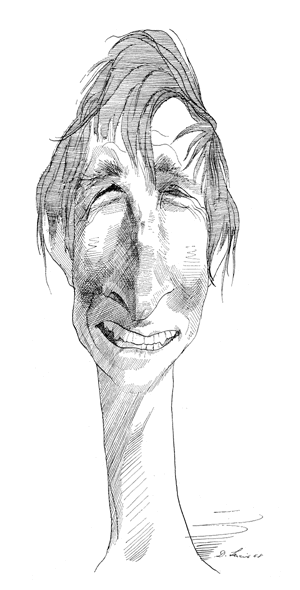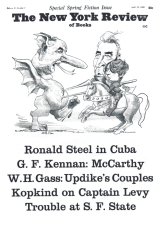The couples live in Tarbox. Come. It is in places marshy. There are trees, lawns of fine description, bodies, houses like them, banks of purply flowered scenes, courts for games, arousing speeches, and the groaning culminations of many amorous machines. That’s because the principal industry in Tarbox is fucking. They think of it, Elizabethanly, as dying, in Tarbox; descents to hell, indeed, are taken every day—through wood-dark poetries unwarily entered by the middleaged. No one dies in Tarbox of too little. Not only the place but the people bear distinguishing names. The heroine is called Foxy by her friends; a dentist whose tongue is like a dental pick (the souls in Tarbox have teeth) is named Thorne, his wife, Georgene; the heedless hero (always in dutch) is Piet Hanema; the pairs most set on swapping are blended prettily together as the Applesmiths. It is a fortunate thing that a family of sheep didn’t stray into town, the combinations might have proved too distracting, especially since this novel is clearly the suburbanite entry in the porno pageant, and I suspect such softloaf sophisticates do not delight in the truly unusual: mulogeny or grampalingus, for instance, meatusfoetus or intermissolonghi. Conversant with the modern texts of sexual hygiene, every reader can redream the acts he reads quite guiltlessly. The obscene, sometimes, can even set a standard. Tarbox sex is often oral, but that’s the way with writers; the penis was never Nature’s purposed instrument of speech.
Mouths, Piet thought, are noble. They move in the brain’s court. We set our genitals mating down below like peasants, but when the mouth condescends, mind and body marry. To eat another is sacred. I love thee, Elizabeth, thy petaled rankness, thy priceless casket of nothing lined with slippery buds.
A perfect wedding of style and subject, writing like this is just the love it describes: you must sweep swiftly by in a wash of passion, for if you stop to reflect you may retch with laughter. In order to handle such scenes successfully, the writer must be sure of his own sexuality; otherwise there will be failures of observation and feeling, and he will render them disgusting or ridiculous, attacking indirectly what he thought he wished, so pointedly, to praise. In Of the Farm, a far more tightly controlled though less ambitious book, there is only one such passage.
…entered, she yields a variety of landscapes, seeming now a snowy rolling perspective of bursting cotton bolls seen through the Negro arabesques of a fancywork wroughtiron balcony…
and so on. It was an unheeded warning.
The steeple of the Congregational Church in Tarbox is tipped with a golden colonial rooster, an English copper glinting in its eye. It has already survived several structures which were destroyed or remodeled beneath it.
Children in the town grew up with the sense that the bird was God. That is, if God were physically present in Tarbox, it was in the form of this unreachable weathercock visible from everywhere. And if its penny could see, it saw everything, spread below it like a living map.
Near the end of the book the church burns, but the weather-bird is saved to turn above another building.
…not a restoration but a modern edifice, a parabolic poured-concrete tent-shape peaked like a breaking wave.
The flames which attacked the church were really sexual. The entire book has been that burning. Now book and church and intercourse are charred, as all such customs and competitors, burned out, must end in charring and in ashes. Unaffected as the phoenix, the vane will point the wind again. It is the same with Tarbox couples and their cult of casual coupling, for in the end they give up screwing one another as a principle and take up bridge instead. Communal sex, they argue, will humanize them. Yet it’s only another while-a-time game, another dogma (“To eat another is sacred”), another freshly fashioned fad religion which will exempt their lives from the laws of living.
THE NOVEL takes its initial form from the computations of pornography and the conversational bat and catch of Edward Albee…much the same. The Appleby-Smiths go through their drills like soldiers. Piet Hanema is carried from one cunt to another like a sea log cresting helplessly. The ladies are strangely all worth bedding, and always a pleasure to lay. The couples’ speech is strong, intentions deep, but feeling’s weak and meaning shallow. Adultery has no interest as a nervous habit. These people do terrible things to one another, but although their conscience troubles them occasionally, it’s only a prick. Everyone is very civilized about his savagery; nobody hits anybody; no one screams convincingly, goes mad, or dies of this contraceptive cruelty. Tarbox, the “post-pill paradise,” is a very tepid hell.
Advertisement
Otherwise the novel’s form is carelessly old-fashioned. A character is introduced. We pause for his description. Gem-like renderings of nature seldom have a function, unless filling the book is a function, and they shatter the text like a window greeting common stones. The interior monologues seem badly imitated Joyce, and many feats of wit and battle come to nothing more than bluster, smirk, and revengeful tattle. The symbolism is sometimes oppressive (“A condom and candy wrapper lay paired in the exposed gutter”), and the religious parallels aren’t convincingly drawn (Piet, the jacket tells us, is a scapegoat, but he is more goat than scape). Then there are those empty expansions of meaning (“Piet felt the fireplace draft on his ankles and became sensitive to the night beyond her hunched shoulders, an extensiveness pressed tight against the bubbled old panes and the frail mullions, a blackness charged with the ache of first growth and the suspended skeletons of Virgo and Leo and Gemini”), unfolding like collapsible tin cups. There’s the poetic epithet (for a nipple: “an unexpected sad solidity”—the cat, heaven help us, has a “throaty motor”); there’s the uselessly precise fact (“He took his accustomed place in a left back pew”), the fake dislocation of words from their normal positions (“She was in only underwear”), the straining, unsoundable line (“In the liquid a slice of lemon lay at fetal peace”), and overexertions of every other kind (“Her receding hollowed the dull noon. Tipped shoots searched for wider light through entropic gray. The salami he made lunch from was minced death”). In a novel like this there is no point in trying to make poetry out of everything.
IN THE MIDST of Tarbox sexual squalor there is a love story lost like a child, and it seems for a time to be part of the author’s plan to contrast Piet’s and Foxy’s adulterous affair, which is beautiful and serious, though carelessly begun, with the empty interlocking of the others. It might have been moving, and the contrast instructive, for Updike (I now mention his name) can be intense, perceptive, subtle. His prose is musical; his celebration of the female body often glorious and cleansing; and his treatment of the sexual is sometimes delicate and deeply touching, male and female softly enclosed in a fine Japanese line. Many passages, countless details, are nothing less than acts of genius. He can form memorable phrases, and condense an image until it becomes a hard fist of meaning. (“He lay on his back like a town suspended from a steeple.” The steeple is Piet’s penis, and the whole novel is held in that suspension.) But to turn sex into an ideology is to attack it; to find it always casual in cause and consequence, to separate it from sin and spirit at the same time, as if the spirit were the price, is to attack it; to expose the symbolically sweetest sides of sexual intimacy (as orality sometimes is) to the abuse of words which praise only out of pride, perversity, and braggadocio, is to attack it centrally; in (as they are felt) the instruments of love itself. Mind and body, value and act, don’t meet.
Thus despite the pills, coils, diaphragms, and hands and mouths employed, cliché must still be served, and Foxy (whom Piet made love to first when she was freshly pregnant by her husband) later, after the birth of that baby, begins to miss her periods because of Piet’s overeager sperm. Now the dirty dentist knows another dentist who will abort our Foxy for a fee, but the villain has his own price: a night with Piet’s cold though shapely wife. Naturally Piet has been sleeping with the dentist’s sweet frau too—Georgene—so it’s sort of snitch for snatch. All humane considerations gone, it is arranged. Waiting in the living room below, while Dr. Thorne is languid with his prize, Piet decides to give Georgene another whirl. All humane considerations gone, this also is arranged. Besides, downstairs he found it chilly. It’s hard to see how anyone could take this diagrammatic melodrama seriously, least of all its author, even though he often seems to. Anyway, it all works out. There are a pair of divorces, and Piet and Foxy marry, move:
The Hanemas live in Lexington, where, gradually, among people like themselves, they have been accepted, as another couple.
O look out. Another couple. People like themselves.
We are promised the weather vane will shine in the sun again. Unreachable, perhaps the bird is God, but I am unpersuaded. It still looks like a cold colonial cock to me.
This Issue
April 11, 1968




